Indian manufacturers of generic drugs are major players in the current global pharmaceutical industry but will they be able to maintain their position in the future? Prospects are dim, says Chirantan Chatterjee, Professor, IIM-Bangalore.
More than half a century back, in 1949, in talking about ‘Molecularization of Medicine’ Linus Pauling demonstrated amazing perspicuity in predicting the changing nature of innovation in the global bio-pharmaceutical industry.
Clcik NEXT to read more...
Why Indian drug companies face an uncertain future
Image: An employee talks with a customer inside a pharmacy in the Glyfada suburb of Athens, Greece.Photographs: Yiorgos Karahalis/Reuters
Ever since, radical developments in basic bio-pharmaceutical science, starting from Watson & Crick’s discovery of the double-helical structure of DNA and also the discovery of recombinant-DNA have only augmented this transformation in the global bio-pharmaceutical industry. This is reflected in the portfolio of drugs of today in the Western world moving from Lipitor or Prozac giving way to drugs of tomorrow - Humira and Rituxan for example.
The former are chemistry-driven small molecule drugs while the latter biology-driven large molecules and they corroborate the changing nature of medicine as predicted by Pauling. In 2015, various industry estimates suggest that about 1/3rd of the blockbuster drugs whose patents will expire will be large-molecule biological drugs in the United States markets.
...
Why Indian drug companies face an uncertain future
Image: Christina Georgiadou arranges a display in Oreokastro, a suburb of Thessaloniki, in northern Greece.Photographs: Yiorgos Karahalis/Reuters
But this changing nature of innovation in the global bio-pharmaceutical industry also raises a big question for health-care policy makers concerned over trade-offs involved in short-run affordable access to drugs over long-run incentives for innovation.
If today’s drugs whose patents are expiring are witnessing their generic versions being supplied by imitator firms who have built capabilities around chemistry-based knowledge, who will supply the affordable imitator versions of biological drugs of tomorrow as their patents expire? The obvious answer might be that it will be the innovators themselves, firms like an Amgen that are specialists in biotech drugs or even traditional big pharmaceutical companies that are opening up their own generic subsidiaries.
...
Why Indian drug companies face an uncertain future
Image: A worker stocks a Walgreens store in Chicago.Photographs: John Gress/Reuters
But that might mean less than optimal competitive pricing and implications for long-run welfare to the society. Another obvious answer is that it could be the generic-small molecule producers of today, firms like Teva in Israel or Indian generic pharmaceutical firms.
The prospects of the final situation panning out successfully, however, seem dim, especially talking about Indian generic producers. In a recent analysis by a paper presented at the UPenn conference on India and innovation, it was pointed out that Indian generic firms have only a handful of patents and publications in the large-molecule space indicating their weak innovative and scientific capabilities in the area.
...
Why Indian drug companies face an uncertain future
Image: An employee looks for medication at a pharmacy in New York.Photographs: Lucas Jackson/Reuters
But more importantly the industry might also be suffering from lack of Pasteurian scientists, who have an eye not only on the consideration of use within the ambit of industrial research but also the zest to advance fundamental knowledge.
Producing similar versions of biological drugs requires more than ‘reverse-engineering’ knowledge, which is till-date the key selling point for Indian generic producers. Producing these drugs, even their imitator versions, requires deeper research and manufacturing related investments (along with patience of course), somewhere close to $300-600 million and a time window of about 6-9 years along with clinical trials for every representative drug.
...
Why Indian drug companies face an uncertain future
Image: A customer takes a look at medication on a shelf at a pharmacy in New York.Photographs: Lucas Jackson/Reuters
Contrast this to a $1 billion required in producing today’s small-molecule innovator drugs and an average period of 10-12 years and it is easy to see why all of this will create substantial entry barriers for the ‘pharmacists of the world’ - for Indian generic producers to transform themselves into the ‘laboratories for large-molecule biological drugs of tomorrow’.
Their cause is also complicated by regulatory uncertainty in India. This relates not just to an embargo on clinical trials in India as per a recent ruling of the Indian Supreme Court, but also to delays in approval of large-molecule launches in local Indian markets, which could be a learning-platform for them before entering export-destinations of developed and other emerging economies within this sub-market of the pharmaceutical industry.
...
Why Indian drug companies face an uncertain future
Image: A pedestrian walks past a branch of Sweden's government-owned Apoteket pharmacy chain in downtown Stockholm.Photographs: Bob Strong/Reuters
Finally, patents as they are being enforced in India today, could mean disincentives not just for multinational firms but also for domestic research and development-driven drug producers in India like a Bengaluru-based Biocon or a Hyderabad-based Dr Reddy’s Laboratories.
To complicate matters, competition is fast endangering their prospects as well. Korean firms like LG Lifesciences and Celltrion along with a handful of Argentinian, Brazilian and Malaysian firms have already upped the ante along with Teva and North American generic firms like Hospira, so has China in becoming increasingly the prime-destination of global bio-manufacturing. The situation thus is worth mulling about not just for global health care policy makers, but also for Indian national health policy experts and perhaps in conjunction as well.
...
Why Indian drug companies face an uncertain future
Image: A customer leans against the pharmacy counter at a Sam's Club store in Bentonville, Arkansas.Photographs: Jessica Rinaldi/Reuters
If Indian generic producers fail to transform successfully from small to large-molecule producers, imitated versions or otherwise, the world will have much to lose in terms of welfare and access to medicines.
They have after all been the harbinger of affordable medicines to the world over the last decade or two. Of course there is another twist to consider in the entire discussion. Taking a leaf out of India’s post-Glivec patenting regime as of 2013, many countries of the world like South Africa or Brazil are moving forward in enforcing a patenting regime that discourages rent seeking behaviour on the part of pharmaceutical innovators.
...
Why Indian drug companies face an uncertain future
Image: Pharmacist Susan Lattier, right, fills prescriptions as technician Ashley Smith, left, looks on at a pharmacy in Cincinnati, Ohio.Photographs: John Sommers/Reuters
Should that pan out tomorrow, one can also foresee, R&D in large molecules getting stunted, which might mean that the world could revert to a state where more efficacious drugs coming from biology-based research will be few and far between and chemistry-based small molecule drugs will continue to the roost.
Physicians around the world have already expressed uncertainty too in switching brands to large-molecules from small-molecule equivalent versions and this switch could be contingent on the nature of the therapeutic markets. That could mean that the global debate on access to medicines will get some respite and the world will continue to march towards its current agenda of affordable health care for some more time going forward.
...
Why Indian drug companies face an uncertain future
Image: A pharmacy in Hollywood, California.Photographs: Fred Prouser/Reuters
Pauling’s prediction might then have to wait a little bit more in panning out as-is for the world of medicine.
Chiratan Chatterjee is an assistant professor in corporate strategy and policy at the Indian Institute of Management-Bangalore and researches on global healthcare markets. He was part of ‘The Legal and Regulatory Framework Promoting and Limiting Innovation: Pharmaceutical & Healthcare IP Innovation’ panel at the ‘India as a Pioneer of Innovation: Constraints and Opportunities’ conference at University of Pennsylvania.

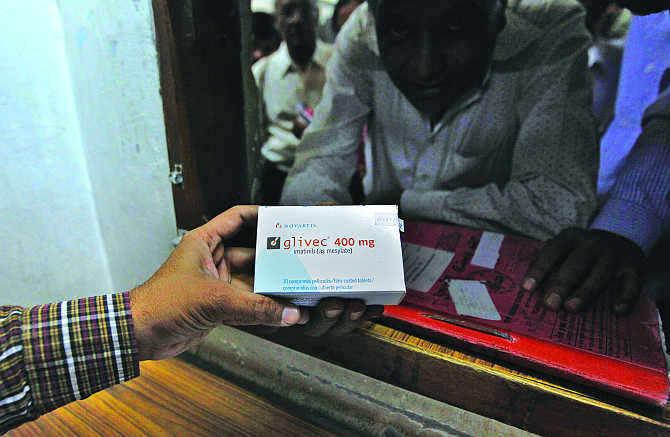



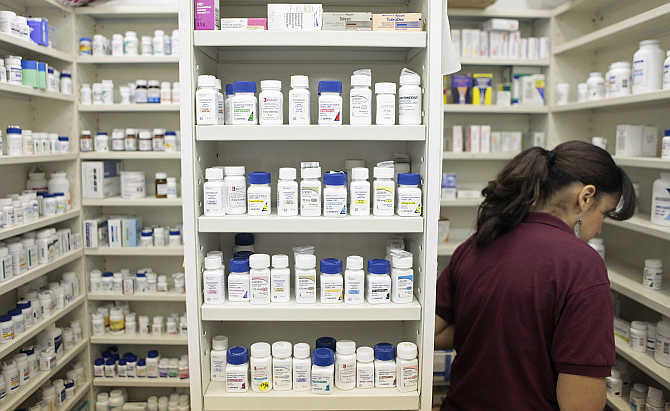

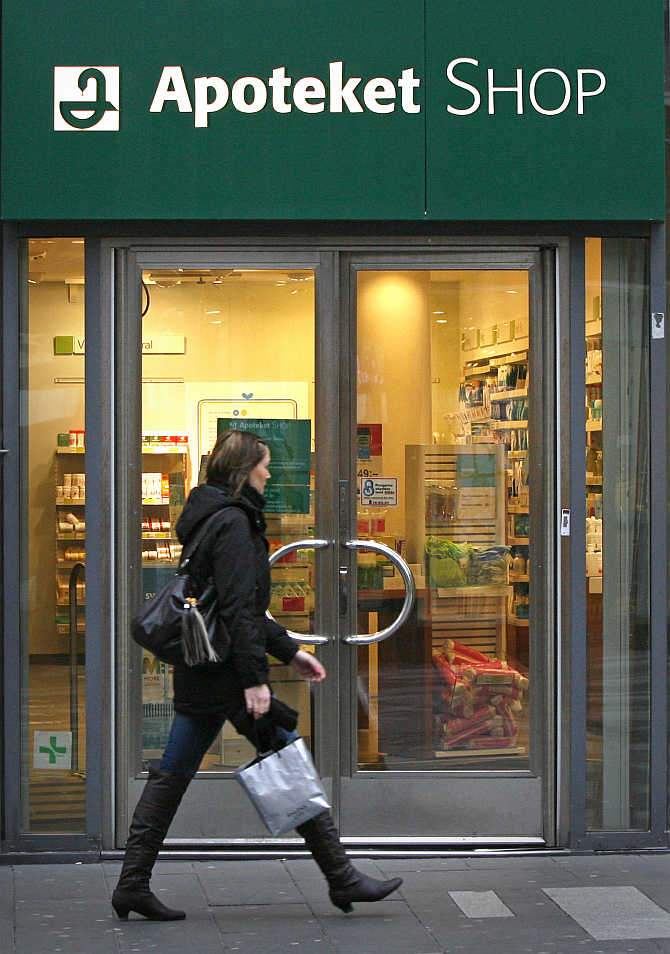



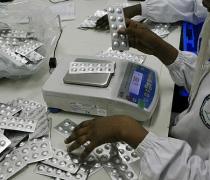
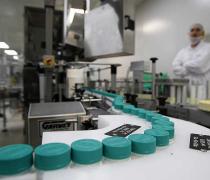

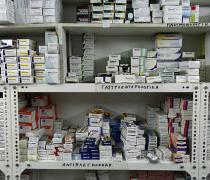


More from rediff